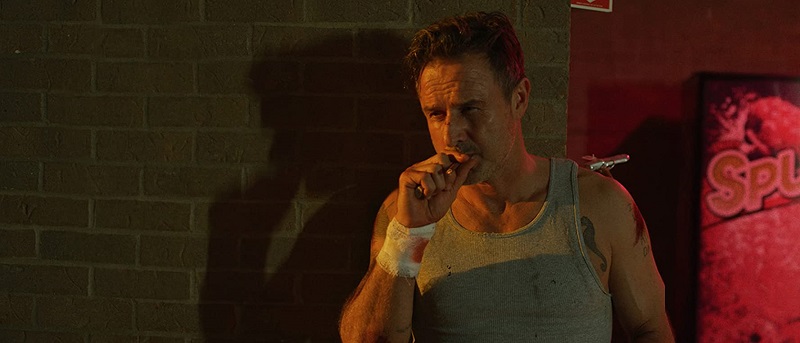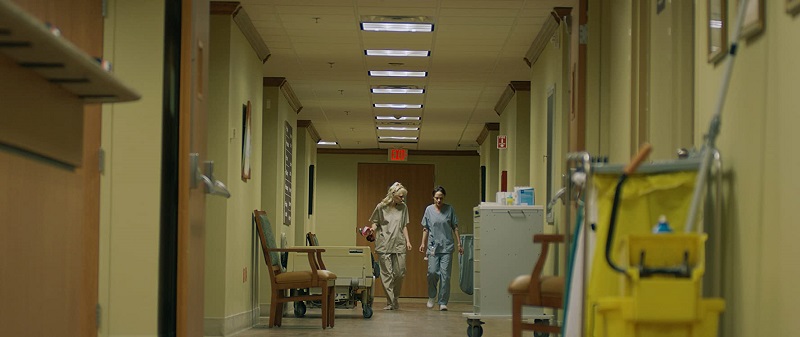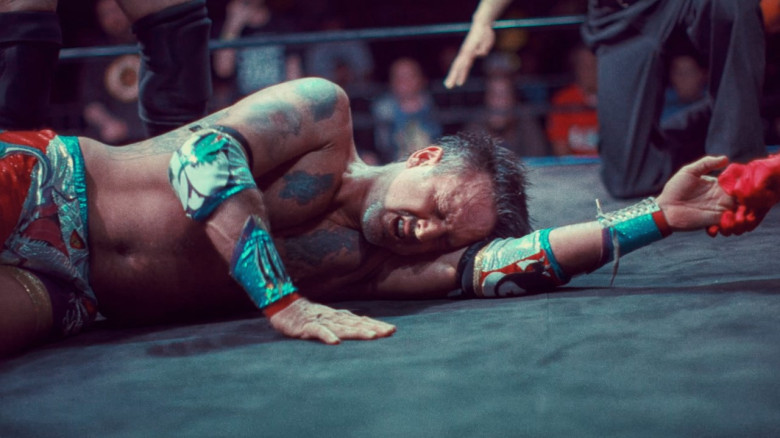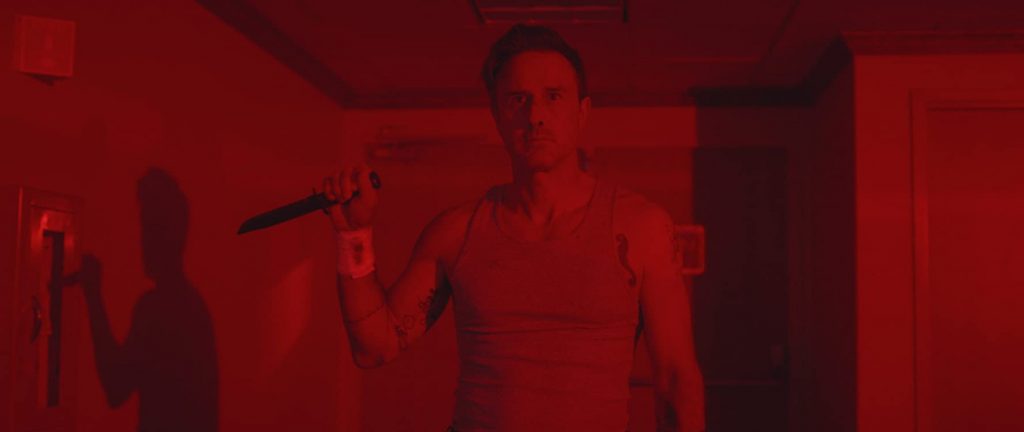In the insanely darkly comic and thrilling film 12 Hour Shift, star (and producer) David Arquette plays an escaped killer who can’t seem to find his way out of the hospital he was brought in to for injuries on the craziest 12 Hour Shift a nurse could endure.

The movie star caught up with The Movie Mensch on an exclusive phone interview where he delved deeply into the making of his latest film, as well as what it was like to have documentary cameras follow him around with his inspiring doc, You Cannot Kill David Arquette, and how his family has played a priceless role in his upbringing and staying steady in a business that makes people anything but placid. Arquette also dishes on what it was like to work with his producer-wife Christina McLarty Arquette—not only on 12 Hour Shift but also the upcoming Ghosts of the Ozarks.
12 Hour Shift features a crazy cast of characters working at an Arkansas emergency room hospital where the main nurse (Angela Bettis) is a drug-addled soul who also is working an illegal organ harvesting operation with her cousin. When a pick-up goes awry, that sets our crazy narrative in motion. It’s an absolutely madcap film with thrills and yes, even humor.
Full review coming tomorrow.
The Movie Mensch: They say it’s good to be bad, and it looked like you had a blast playing Jefferson in 12 Hour Shift. Is that safe to say?
David Arquette: It’s true. I had a lot of fun playing Jefferson. We all had a lot of fun making this movie.
The Movie Mensch: What was your biggest takeaway from working with Angela Bettis, who plays Mandy. I mean, she carries the movie and is just insane!
David Arquette: Yeah, Angela was so impressive. She’s such a wonderful actress and the character she’s developed for just demeanor. She was just so wonderful. I was super, super impressed. I loved working with Angela. She’s such a tremendous actress. She brings such a reality. She’s just grounded, and real, and subtle. I learn a lot from working with different actors whenever I do, and I learned a tremendous amount from her. She’s just so subtle in her performance, and she really takes her time, and she’s got an incredible soul that just comes out, even though she’s playing this really dark character.
The Movie Mensch: She sure did. You also produced the film along with your wife, I see. What was it like getting to work with Christina? That had to be nice.
David Arquette: It’s wonderful. It was her first feature film that she’d produced. She’d produced a documentary before that, and I was just so impressed. I told her, “You’re the best producer I’ve ever worked with,” and she was like, “Stop it.” But she went to NYU for journalism and was a reporter, so the toolbox that she got in that world fit in perfectly with producing. And it was just fun to have her on set—at this hospital. She is a bit of a hypochondriac, so she had all these wipes and all these things before even this whole COVID world [laughs]. She was on it. She was on it for sure. And also, HCT Media were really great. Their producers on it as well, Jordan and Matt… and Matt filmed the whole thing. We had a great team. Also, Tara Perry as well… was a great producer and incredible actress in the film.
The Movie Mensch: We were talking a little bit before about Brea Grant, and she appears to be quite the force of nature too. With your two hats on, producer and actor, what would you like everyone to know about what she brings to the table as a storyteller?

David Arquette: Brea’s the whole package. She writes, directs. She’s an incredible actress as well. I really wished I could have acted with her as well. That was the only thing that I’d say was missing, was the ability to be able to act opposite her because you really get to learn a lot about people when you act with them. And it’s just fun, it’s just a fun thing. But it was also fun being directed by her. She knew exactly what she wanted. She’s incredible, working with the cameras, setting up shots, and translating a picture into storytelling.
The Movie Mensch: It really comes through. Speaking of incredible stuff, I was so inspired by your documentary, You Cannot Kill David Arquette. I too have had a heart issue, I had emergency open-heart surgery.
David Arquette: Oh, man.
The Movie Mensch: I was just so inspired by what you were able to achieve. What has been the response for you, hearing from people like me who are moved by your story, or just the experience of making that?
David Arquette: Oh, man. I did DDPY which is Diamond Dallas Page’s workout program. It helped me to start on this path of losing 50 pounds to get in shape so I could get into the ring. Then I did boxing, jujutsu, wrestling training, and just really got in shape. And that was just so good for my heart, it just helps pump everything out, and it’s something you have to do every day. You have to pump it out to just stay healthy. Then just getting into the ring and experiencing the abuse that my body took, and just learning what these guys go through on a daily basis. The kind of pain you’re in, it’s a constant basis. It’s pretty remarkable how they do this all for their career. I have the utmost respect for wrestlers now. I learned a lot about myself too. I’d been beating myself up for years. So, it was really interesting that the documentary captured that time period. And I’m glad I made it through it, but it definitely had its periods there where it looked pretty sketchy.
The Movie Mensch: Was it hard to open yourself up like that and have cameras documenting it, or was it kind of cathartic at the same time?

David Arquette: It was cathartic. I’ve been a pretty open book about certain things. I’m not a big fan of people putting up false facades about things they’re going through. I think when you talk about issues, that hopefully, people can relate and not beat themselves up, or find strength in certain things. I do like honesty. I think it makes for good subject matter, or subject of a documentary when they’re vulnerable and honest, and really open about their lives.
The Movie Mensch: I know family can drive you crazy, but no one will get your back like them. What has it meant to you to have several members of your family share your line of work, and keenly understand what you’re going through?
David Arquette: I have a wonderful family. I mean, starting with Christina, my wife, just producing the documentary, and just being there on camera to just getting my bag, dealing with the ups and downs of the struggles of dealing with a wrestler that’s injured, and having to deal with going on the road, and all this stuff she did. Then my sisters (Patricia Arquette and Rosana Arquette) and my brother Richmond. They’ve all been really supportive. They all understand how much rejection’s involved in Hollywood and how painful that is. We all saw our father go through that for 45 years as a character actor, and how difficult it is. It’s a business that, you may have one door open that leads to a fun job, but you have a thousand that are slammed in your face before that. You just have to build a really thick skin and really not take it personally, which has been a big lesson of mine.
The Movie Mensch: Yeah. I bet.

David Arquette: And then just believe in yourself. You can’t let the world beat you down. You really have to keep going. No matter how hard it all seems, you just have to put your boots back on and get back out there.
The Movie Mensch: I noticed you’re also working with your wife in producing Ghosts of the Ozarks, and obviously, we just said you produced 12 Hour Shift. As a producer, what do you look for in a story, that makes you want to say, “Okay, I got to work on this one”?
David Arquette: Just look for a great story, great partners to work with. We worked the HCT Media on that as well, and Devil Tub Productions. When you find a script that has a really great story, that has really interesting characters, that are supported by really wonderful actors, it makes it fun. I mean, you look for something that will move you, something that you can relate to, something that you’ll find exciting, or entertaining. And Jordan Long and Tara Perry wrote a script, it’s a really exciting story, and they’re just such tremendous filmmakers. They can man the cameras, they can build the sets, they can really do everything. It was fun to do that with them.
The Movie Mensch: Awesome. Well, David, thank you so very much for your time.
David Arquette: Hey, you too, Joel, thanks. Thanks for the interview. I’m glad you’re making it through this hard situation. It’s not easy.
The Movie Mensch: No, it is not.
David Arquette: That’s scary. All the best, buddy.

